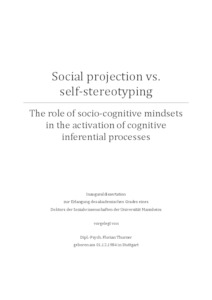|
Social projection vs. self-stereotyping : the role of socio-cognitive mindsets in the activation of cognitive inferential processes
Thurner, Florian
![[img]](https://madoc.bib.uni-mannheim.de/46239/1.hassmallThumbnailVersion/Dissertation_Thurner.pdf)  Vorschau |
|
PDF
Dissertation_Thurner.pdf
- Veröffentlichte Version
Download (2MB)
|
|
URL:
|
https://madoc.bib.uni-mannheim.de/46239
|
|
URN:
|
urn:nbn:de:bsz:180-madoc-462393
|
|
Dokumenttyp:
|
Dissertation
|
|
Erscheinungsjahr:
|
2018
|
|
Ort der Veröffentlichung:
|
Mannheim
|
|
Hochschule:
|
Universität Mannheim
|
|
Gutachter:
|
Meiser, Thorsten
|
|
Datum der mündl. Prüfung:
|
5 September 2018
|
|
Sprache der Veröffentlichung:
|
Englisch
|
|
Einrichtung:
|
Fakultät für Sozialwissenschaften > Psychologische Methodenlehre u. Diagnostik (Meiser 2009-)
|
|
Fachgebiet:
|
150 Psychologie
|
|
Normierte Schlagwörter (SWD):
|
Psychologie , Dissertation , Sozialpsychologie , Stereotyp , Priming
|
|
Freie Schlagwörter (Englisch):
|
social cognition , self-construal , situated cognition , social projection , self-stereotyping
|
|
Abstract:
|
In which way does the priming of socio-cognitive mindsets influence the
predominance of cognitive inferential processes? Incorporating research on
social-status differences on the one hand and on cross-cultural differences
on the other hand, this dissertation takes a new perspective on the
directionality issue of cognitive inferential processes. Based on previous
research in these areas, it is assumed that the currently active mode of
self-construal constitutes a fundamental factor which influences the
construction of personal experience and behavior and which determines the
direction of cognitive inferential processes: Socio-cognitive mindsets are
proposed to account for a basic factor which influences the individual’s
way of construing his or her world. It was hypothesized that an independent
mindset with its distinctive focus on the individual would cause a person
to interpret his or her world from the individual’s point of view (social
projection). On the other hand, it was suggested that an interdependent
mindset with its more pronounced focus on social context and on other
persons would trigger the reversed process (self-stereotyping).
After these initial hypotheses could not be confirmed in the course of
three experiments, an alternative hypothesis was suggested in an attempt to
explain the contrary but largely consistent results. In the second part of
this thesis, implications of Optimal Distinctiveness Theory (Brewer, 1991)
were taken into account. A person’s individually preferred level of
distinctiveness was suggested to depend on the currently active
socio-cognitive mindset. As a post-hoc explanation, it was proposed that,
via the employed priming methods, reactant responses may inadvertently have
been triggered: participants’ preferred equilibrium may have been shifted
undesirably along the dimension personal vs. social identity. As a result,
participants may have engaged in corresponding compensating
counter-reactions. A final experiment was conducted in an attempt to
replicate previously obtained paradox effects and to make them directly
visible.
|
 | Dieser Eintrag ist Teil der Universitätsbibliographie. |
 | Das Dokument wird vom Publikationsserver der Universitätsbibliothek Mannheim bereitgestellt. |
 Suche Autoren in Suche Autoren in
Sie haben einen Fehler gefunden? Teilen Sie uns Ihren Korrekturwunsch bitte hier mit: E-Mail
Actions (login required)
 |
Eintrag anzeigen |
|
|
